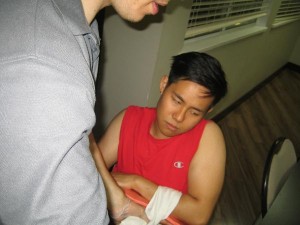CPR in Honolulu has a wide range of basic and advanced CPR training courses, all offered at very affordable rates. We encourage prospective trainees to visit our provider in the commercial district of Honolulu, and become oriented on the CPR programs we offer through the week. Out of our five programs (and three re-certification classes), we have one program for the general public while the rest are for people who work in health care.
Heart failure and cardiac arrest
Cardiac arrest is an inevitable result of heart failure, with more than half of people diagnosed with heart failure dying in the first five years after diagnosis. Heart failure is a result of severe cardiac dysfunction, and can manifest in a number of symptoms, primarily the following:
- Shortness of breath (SOB), even during normal daily activities

Splinting is taught as a first aid lesson to all students. Splints are used to keep injured limbs immobile to prevent further injury. - Difficulty breathing when lying down
- Edema (swelling) in the lower extremities, starting with the ankles
- Easy fatiguability, after normal daily activities
Heart failure is a diagnosis that is characterized by the inability of the heart to provide adequate circulation needed by the body. When the heart can no longer tolerate the stress needed to support the body, it can go into arrest. Arrest is dangerous because it means the heart has stopped functioning completely – either experiencing severe arrhythmia and/or asystole.
Giving CPR to victims
Out-of-hospital cardiac arrests are very common, with roughly 400,000 happening each year. These are the most dangerous kind of cardiac arrests because out of 359,400 arrests in 2013, bystander response rate was only 40.1 percent. Survivor rates are extremely low as well, only 9.1 percent.
CPR uses a series of chest compressions and ventilations to oxygenate the blood and make it circulation through the body. In basic CPR, these skills are meant to stabilize the victim enough for transport. Bystander CPR is done merely to start management before the EMTs arrive. Advanced CPR, done in a hospital’s emergency room, is focused on medical management – that includes the use of medication, equipment, and diagnostics.
CPR and first aid training in Honolulu
We offer CPR training in eight courses: five training and three re-certification classes. They can range from 4 hours to as long as 16 hours. Basic courses are typical single-session classes while advanced courses last two days. If you are a HCP and want to enroll in ALS training, you need a valid BLS for HCP certificate.
- Heartsaver course – Basic Life Support, 4 hrs. (general public)
- Heartsaver C course – Basic Life Support, 4.5 hrs.
- Basic Life Support for HCPs – Basic Life Support, 4.5 hrs.
- Advanced Cardiac Life Support (ACLS) – 2 days, 16 hrs.
- Pediatric Advanced Life Support – 2 days, 14 hrs.
Re-certification
- Basic Life Support for HCPs – 4 hrs.
- ACLS – 5 to 6 hrs.
- PALS – 6 to 8 hrs.
Re-certification courses are available for only three our programs, all for HCPs. Rescuers who have credentials that are nearing expiry can renew them through a re-certification class. However, for credentials that are expired, the rescuer has to take the training program again. So don’t forget to renew!
